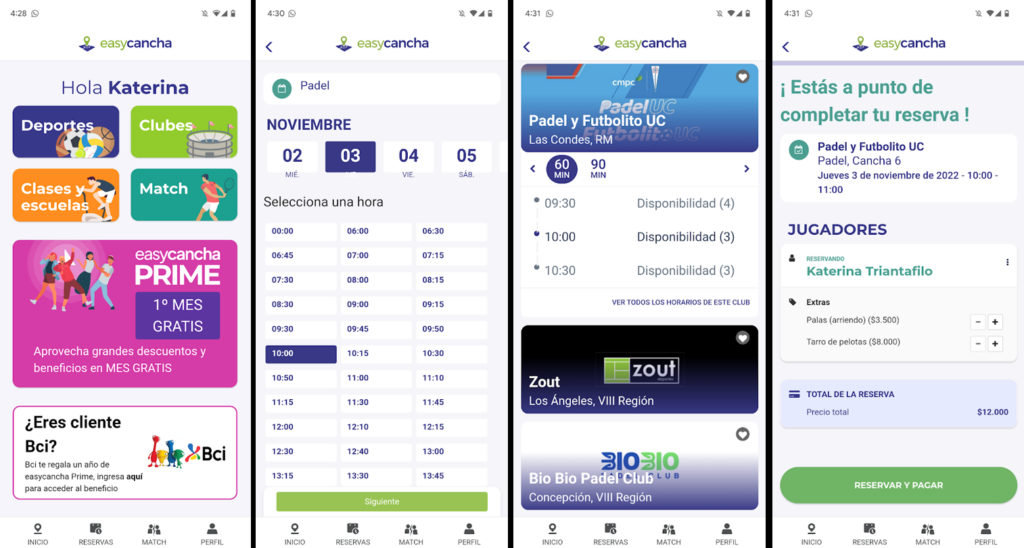EasyCancha: Connecting sports men and women with sports facilities … and other sporty people

easycancha started as an online platform that connects people that want to play certain sports with the various sport facilities that they have near them
Context
EasyCancha was launched in 2017 in Chile to help people that wanted to play various sports (Tenis, Padel, baby footbal, footbal, raquetball etc) find places nearby where they could rent out courts that were available at a certain time and date.
The application was solving the pain point of having to go through various different online reservation pages to find a court for the day and time a group of friends wanted to meet and play a certain sport. Working as a consolidation platform it created a network effect throughout the years were more and more sport facilities came onboard with more offerings, broadening the amount of locations the app offered and therefore getting more users onboard, and so on.
The offerings you get as a user are based on your geolocation and the date and time you are planing to play. It looks for the best available court as close as possible to your location in the date and time you are requesting, and if there is poor availability of courts, it starts broadening the distance to other facilities.

Value Creation
The main value creation for sport facilities is the growth in reservations in their facilities due to the increasing amount of people wanting to play sports in the platform. Facilities are benefiting from users that without the platform would have probably not gone through the trouble of visiting the sports facility direct online booking website. Through an increasing number of reservations there is also an increasing number of cross-selling of different accomodations in the sporting facility and of sports equipment rentals since a lot of users are amateurs that may not have the neccesary accesories to play certain sports.
For some sport venues, especially small ones, they don’t have a sophisticated reservation system and do not keep track of their customer base. This platform gives them a relatively cheap onboarding to the online easy-to-book world.
For users the main value creation is availability and convenience, the fact that the platform’s algorythm is capable of giving the them the best possible option regarding the time, place and sport they want to play is a time saver.
Monetization
The platform charges a fixed percentage fee for every reservation in some cases and in other cases it charges a fixed fee. This depends on the type of sport facility, since there are many big sport facilities where even club members reserve courts through the app, but they don’t actually pay for the court.
Throughout the years, they have added advertisement on the platform, always focused on sporting brands, medical attention focused on sports and sports insurance.
Lately they launched “easycancha PRIME”, a prime subscription where the user pays 2 dollars a month and has acces to various discounts in physical therapy, sport massages, training sessions, sports apparel and others. The subscription also allows the user to receive a notification when their favorite court becomes available and other specific benefits.
Broadening the Ecosystem
Throughout the years, and especially going through COVID, the platform managers came across another pain point their users were having. Most sports needed a partner or several other people to play against, which sometimes can be hard to get a friend who is available at the same time and has the same expertise level in a certain sport. Easycancha launched “MATCH”, which, like a dating app, matches you with people of your same level in a specific sport, who are looking to play in locations that the user previously filtered as favorites:

This addition increased number of reservations even higher, making use of some idle times of courts that were not used during the day.
Scalability and next steps
Easycancha has managed to undersand their end customer and has pivoted their offerings and the user experience based on feedback from them and their venue partners.
In 2021, they started their international expansion, starting with Brazil, Argentina and Colombia. There have been some minor changes in the business model, but the main pain point in these countries was exactly the same as the one the founders saw in Chile, and they’ve managed to get the network effect working.
Next steps are Mexico and the United States, one of the most competitive markets in their opinion. Will they be succesful? Or will they have to change their business model significantly for it to work in a country that some consider to be extremely different to Latin American countries?
Sources:
- https://chile.as.com/masdeporte/la-aplicacion-que-revoluciona-el-deporte-en-chile-queremos-crear-el-ecosistema-mas-grande-n/
- https://dfmas.df.cl/df-mas/muevete/la-jugada-de-easycancha-para-conquistar-latam
- Personal Experience 🙂



Super cool app that I have been missing in Europe and especially in Switzerland for years! Sure, digital booking systems for different sports venues is no rocket science but I see a fantastic added value in the matching tool. Too often I was looking to play tennis or squash and all my known sparing partners were not available. However, the question I always ask myself with this matching is the difficulty of self-assessing one’s own level. When players are not officially ranked, it may not always be easy to find the appropriate match right away – be it for your own under- or overestimation.
Looking forward, I foresee an extraordinarily sustainable future for EasyCancha. With a large user base, countless applications and extensions are conceivable on this platform. I am thinking of coaching services, where for example tennis coaches can offer their services to a broader audience, or EasyCancha tournaments, where the best user of the platform is determined in a specific sport. Since the whole service is offered digitally, scalability does not seem to be a problem in the long term. I’m thrilled about this platform and looking forward for such a solution to catch up in Europe.
Super interesting post, thank you Katy. As many startups, easycancha started with a simple service of matching spots courts with users interested in playing sports, which added value on both sides of the platform. I love how they’ve broadened their scope over time to include relevant advertising, matching different players and offering a membership that provides access to ancillary services.
I wonder if the platform gets disintermediated at some point once users become familiar with the courts they like to book and if they can circumvent the booking fee. There is an element of convenience of going through the platform, but as courts digitalize their own booking and payment systems I think there is a risk that at least some of its users start circumventing the platform. The best strategy the platform can use in my view is to continue to create differentiated value through its membership program to increase subscription revenue and increase switching/disintermediation costs for its users.